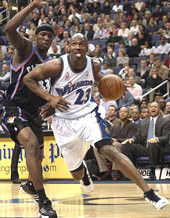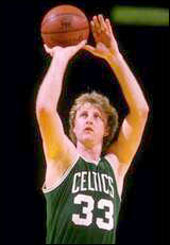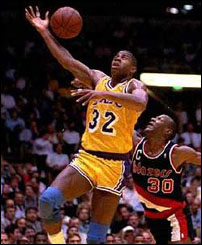|
● Football
● How
the Game Is Played
● Baseball
● How
the Game Is Played
● Basketball
● How
the Game Is Played
● Other
Sports Activities
Basketball
 |
|
Basketball
|
 Basketball
was deliberately created in 1891 by a physical education teacher
in Massachusetts, Canadian-born James
Naismith, to provide an indoor sports activity during the
snowy winter months when outdoor playing fields could not be used.
The basic rules of the game have not much changed since then. Today
however there are many basketball courts set up out of doors, and
youngsters frequently fix a hoop to a convenient post or
even a wall in order to practice playing the game. Basketball
was deliberately created in 1891 by a physical education teacher
in Massachusetts, Canadian-born James
Naismith, to provide an indoor sports activity during the
snowy winter months when outdoor playing fields could not be used.
The basic rules of the game have not much changed since then. Today
however there are many basketball courts set up out of doors, and
youngsters frequently fix a hoop to a convenient post or
even a wall in order to practice playing the game.
 In
recent times, a new rule requires a team to try to score within
a brief time: 35 seconds in the collegiate game, 30 seconds in international
play, and 24 seconds in American professional play. Teams that are
leading in scoring no longer have the luxury of passing the ball
around safely out of reach of the defensive team; they must shoot
at the basket before the shot clock runs down. The clock
is set at, for example, 24 seconds when a professional team gains
possession of the ball. It then ticks down to zero, unless someone
attempts to shoot the ball into the basket. Either the offensive
team scores, or it recovers the missed attempt, or the opposing
team gains possession. In all cases, the clock is reset. In
recent times, a new rule requires a team to try to score within
a brief time: 35 seconds in the collegiate game, 30 seconds in international
play, and 24 seconds in American professional play. Teams that are
leading in scoring no longer have the luxury of passing the ball
around safely out of reach of the defensive team; they must shoot
at the basket before the shot clock runs down. The clock
is set at, for example, 24 seconds when a professional team gains
possession of the ball. It then ticks down to zero, unless someone
attempts to shoot the ball into the basket. Either the offensive
team scores, or it recovers the missed attempt, or the opposing
team gains possession. In all cases, the clock is reset.
 Basketball
therefore is a fast game, which does not permit leisurely snacking.
Most fans sip a cold drink, or possibly dip into a large
bag of popcorn, while watching the teams race back and forth on
the court. Because it is such a fast game, the score can suddenly
shift, and many games are won or lost in the final few seconds of
play. This keeps spectators at the game until the very end, whereas
in football and baseball many fans leave before the game is over
when one team is so far ahead that the outcome seems certain. Basketball
therefore is a fast game, which does not permit leisurely snacking.
Most fans sip a cold drink, or possibly dip into a large
bag of popcorn, while watching the teams race back and forth on
the court. Because it is such a fast game, the score can suddenly
shift, and many games are won or lost in the final few seconds of
play. This keeps spectators at the game until the very end, whereas
in football and baseball many fans leave before the game is over
when one team is so far ahead that the outcome seems certain.
 Invented
in 1891, basketball had its first professional team in 1896. But
it wasn't until 1950 that the National
Basketball Association of professional teams was established.
For the next thirty years, professional basketball did not have
much of an audience. In 1979 two college players, Larry Bird of
Indiana State University and Magic Johnson
of Michigan State University motivated an increased interest in
the game through their friendly rivalry. Bird subsequently joined
the Boston Celtics, and Johnson the Los Angeles Lakers.
Both teams dominated the professional game through the 1980s and Invented
in 1891, basketball had its first professional team in 1896. But
it wasn't until 1950 that the National
Basketball Association of professional teams was established.
For the next thirty years, professional basketball did not have
much of an audience. In 1979 two college players, Larry Bird of
Indiana State University and Magic Johnson
of Michigan State University motivated an increased interest in
the game through their friendly rivalry. Bird subsequently joined
the Boston Celtics, and Johnson the Los Angeles Lakers.
Both teams dominated the professional game through the 1980s and
 |
 |
|
Larry Bird
|
Magic Johnson
|
|
|
|
|
Boston Celtics
|
L.A.Lakers
|
even into the 1990s. The growing market
in larger sized TV sets also helped, since basketball games are
hard to follow on small screens, and the game is played in an arena
that frequently seats fewer than 20000 spectators. (The largest
arena currently is the Charlotte (NC) Coliseum seating 24000 viewers.)
 After
a few exhibition games in the fall, the 82-game season begins the
first week in November. In mid-February, there is an intermission
for the All-Star game, where the best players from teams
in both Eastern and Western divisions, display their skills.
In mid-April, the eight teams with the best records in each division
begin a series of play-off games, where the winner of four out of
seven games in a series advances to meet the winners of another
play-off series. Finally, the survivors in each division meet for
the NBA Championship series of games. After
a few exhibition games in the fall, the 82-game season begins the
first week in November. In mid-February, there is an intermission
for the All-Star game, where the best players from teams
in both Eastern and Western divisions, display their skills.
In mid-April, the eight teams with the best records in each division
begin a series of play-off games, where the winner of four out of
seven games in a series advances to meet the winners of another
play-off series. Finally, the survivors in each division meet for
the NBA Championship series of games.
 At
the collegiate level, teams play a schedule of games based on both
the geographical location of the university and its size and resources—a small liberal arts college would not be fairly matched with
a large state university, with a much larger sports department.
Records are kept on all these so-called conferences, and in March
sixty four (64) winning teams from the conferences around the United
States are matched against each other in a single game elimination
series called March Madness. Thirty two teams are eliminated
the first weekend, sixteen the next, and so on until there are only
four teams left, the Final Four. And they play two games on one
weekend the end of March to determine the collegiate champion. At
the collegiate level, teams play a schedule of games based on both
the geographical location of the university and its size and resources—a small liberal arts college would not be fairly matched with
a large state university, with a much larger sports department.
Records are kept on all these so-called conferences, and in March
sixty four (64) winning teams from the conferences around the United
States are matched against each other in a single game elimination
series called March Madness. Thirty two teams are eliminated
the first weekend, sixteen the next, and so on until there are only
four teams left, the Final Four. And they play two games on one
weekend the end of March to determine the collegiate champion.
Previous Page Next
Page
|

